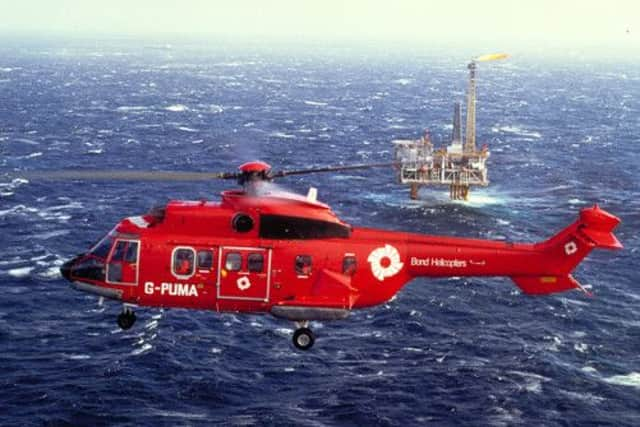North Sea Super Pumas set to resume flights


All 16 Super Puma EC225s operating in the North Sea – one-fifth of the entire offshore fleet – have been grounded since 22 October last year when a Super Puma EC225 operated by CHC Helicopters was forced to ditch off Shetland. Another ditched 30 miles off the coast of Aberdeen in May last year.
Both ditchings led to the discovery of “potentially catastrophic” mechanical failures in the gearbox – identical cracks near a weld in the main vertical gear shaft of the workhorse of the North Sea. In both cases, tests showed identical problems which resulted in a false alarm being issued over a lubrication system failure.
Advertisement
Hide AdAdvertisement
Hide AdEurocopter, the French manufacturer of the Super Puma EC225, has been carrying out tests on the faulty gearbox since last year to determine the exact cause of the problems.
Now the European Aviation Safety Agency (EASA) has published an airworthiness directive which has approved a technical solution proposed by Eurocopter for its EC225 fleet.
The UK Civil Aviation Authority said it will allow aircraft to return to service once the requirements of the directive are met.
According to an EASA spokesman the safety agency has put in place a new set of checks and modifications which will help engineers detect potential weaknesses and improve safety.
The Civil British Aviation Authority has accepted the EASA suggestions and said the Super Puma helicopters would be returned to service once the modifications had been made.
A spokesman for Eurocopter said the company had carried out an investigation into cracks found in the Super Puma engines and had suggested ways the helicopters could be made safer. This is a major milestone to ensure that the first EC225s of the suspended fleet can be ready for a return to flight in July.
He said: “We expect the operational restrictions imposed by certain national aviation authorities to be lifted shortly. Eurocopter is now focused on supporting customers to put in place the required modifications and maintenance activities.”
A spokesman for Britain’s Civil Aviation Authority said: “Following publication of an airworthiness directive by EASA, the UK Civil Aviation Authority will amend its operational restriction on the helicopter type, allowing each aircraft to return to service once the requirements of the EASA directive are met.”
Advertisement
Hide AdAdvertisement
Hide AdIt was revealed earlier this year at a summit in Aberdeen that the confidence of the vast majority of the offshore workforce in the safety of the North Sea’s helicopter workhorse has been shaken as a result of the two Super Puma ditchings.
Two-thirds of the 1,604 oil workers who took part in an online survey, commissioned by industry body Oil & Gas UK, said their confidence in the safety of the Super Puma EC225 had decreased since the 2012 incidents.
An Oil & Gas UK spokesman said of the EASA announcement: “The safety barriers proposed will give several layers of assurance that this helicopter is safe.”